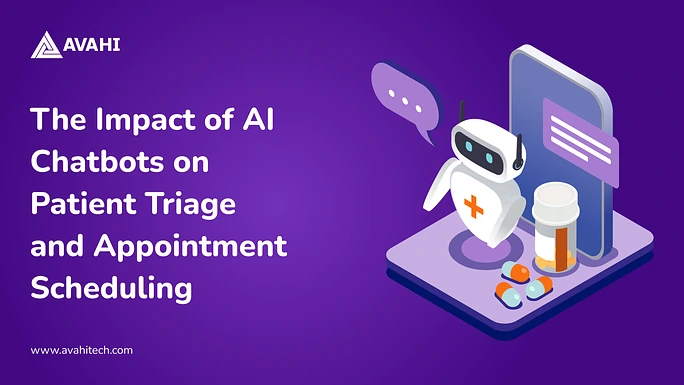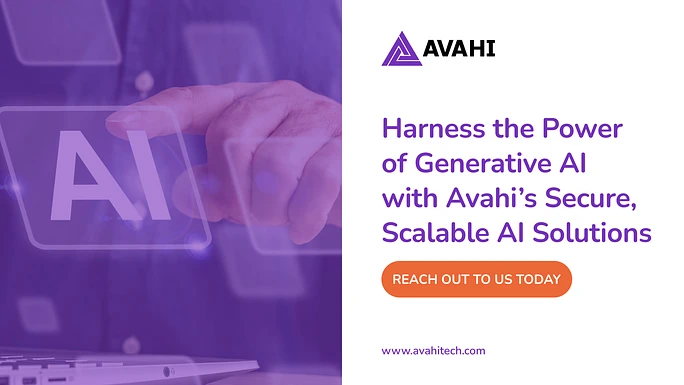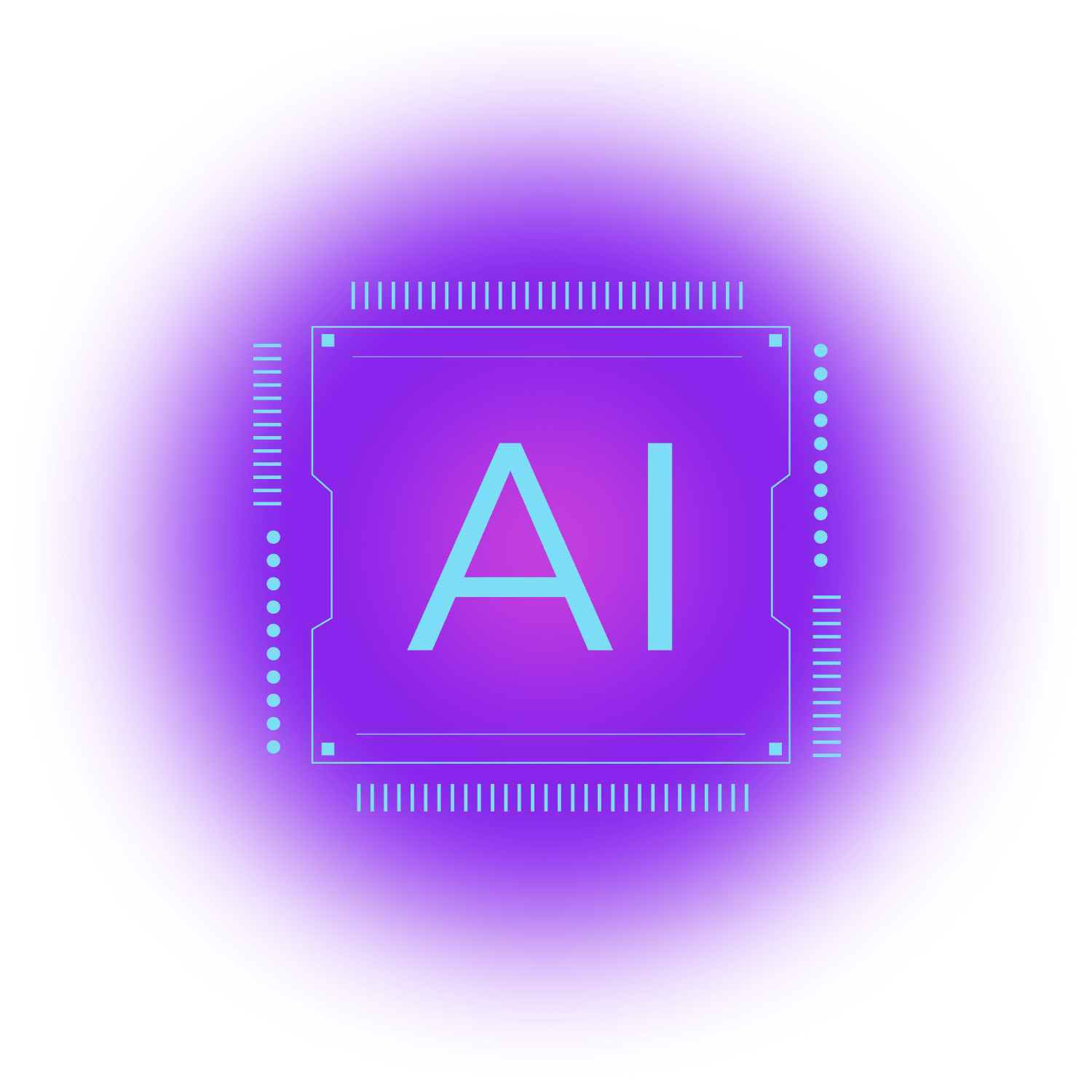The healthcare system is facing an urgent challenge—rising patient demand, staff shortages, and administrative inefficiencies are overwhelming providers and delaying care. Studies show that nearly 50% of doctors’ time is spent on administrative tasks rather than patient care, and over 30% of emergency room visits could have been handled by primary care or telehealth services. These inefficiencies increase costs and put patients at risk due to delayed diagnosis and treatment.
AI-powered chatbots transform patient interactions by automating symptom assessments, directing patients to the proper care, and optimizing appointment scheduling. Studies show that AI chatbots can handle up to 80% of routine healthcare queries, reducing wait times and allowing medical professionals to focus on severe cases. With 24/7 availability, they provide quick, accurate symptom assessments and help reduce the workload of medical staff.
In this blog, we explore how AI chatbots are improving patient triage and appointment scheduling, making healthcare more efficient and accessible for both providers and patients.
The Need for Effective Patient Triage
Triage evaluates patients’ symptoms to determine how urgently they need medical attention. Conventional triage methods often involve long phone calls with nurses or in-person visits to emergency rooms or urgent care centers. This can result in:
- Delays in Care: Patients with non-urgent conditions may visit emergency rooms unnecessarily, while those needing immediate care may not receive timely attention.
- Overwhelmed Healthcare Staff: Nurses and doctors spend valuable time conducting initial assessments, which could be automated.
- Patient Frustration: Long wait times and uncertainty can cause stress and anxiety for patients.
AI chatbots help streamline the triage process by collecting patient symptoms, analyzing them using medical algorithms, and categorizing cases based on urgency. This ensures that patients with mild symptoms receive self-care recommendations, while those with severe conditions are directed to the appropriate healthcare facility without unnecessary delays.
The Importance of Optimized Appointment Scheduling
Once a patient determines they need medical attention, booking an appointment should be simple and quick. However, many patients experience difficulties when trying to schedule a visit:
- Long Hold Times on Calls: Patients often spend time waiting on phone lines to schedule appointments, which can lead to frustration.
- Limited Availability: Finding a doctor available at a convenient time can be challenging, especially in busy healthcare facilities.
- High No-Show Rates: Missed appointments disrupt clinic operations and delay care for other patients.
Role of AI-Powered Chatbots in Improving Patient Triage
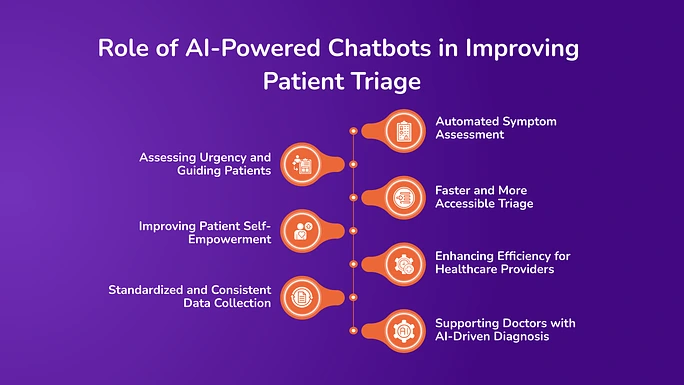
Conventionally, triage required an in-person visit or a phone consultation with a nurse, leading to long wait times and inefficiencies. AI-powered chatbots can now handle initial patient assessments, offering fast, accessible, and structured guidance based on symptoms and medical history. Below is a detailed breakdown of how AI chatbots improve patient triage:
1. Automated Symptom Assessment
AI chatbots can collect and analyze patient symptoms using conversational AI and natural language processing (NLP). This automation allows for an accurate and structured evaluation of a patient’s condition.
Patients describe their symptoms in simple language, and the chatbot understands and processes the input through NLP, much like a human would.
The chatbot asks follow-up questions based on the patient’s responses to refine symptom assessment. For example, if a patient reports a fever, the chatbot may ask about its duration, severity, and associated symptoms like chills or body aches.
AI chatbots personalize assessments by considering past medical history, medications, and pre-existing conditions. This ensures that symptom evaluation is more accurate for individual patients.
2. Assessing Urgency and Guiding Patients
Once symptoms are assessed, AI chatbots categorize the patient’s condition based on urgency, helping them seek the appropriate level of care.
Chatbots use predefined algorithms to classify symptoms into different urgency levels, such as:
- Mild (self-care recommendations)
- Moderate (suggesting a primary care visit)
- Severe (advising urgent or emergency care)
Many patients visit the ER unnecessarily due to uncertainty about their symptoms. AI chatbots help guide non-critical cases toward outpatient care, reducing hospital congestion.
Tools like NHS 111 Online (UK), Ada Health, and Buoy Health are already helping patients determine whether to visit a doctor, seek emergency care, or follow self-care measures at home.
3. Faster and More Accessible Triage
One of the significant advantages of AI chatbots is their ability to provide 24/7 triage, ensuring that no patient is left without guidance, regardless of the time or location. Unlike triage methods involving long wait times on helplines or waiting rooms, AI chatbots can provide instant preliminary assessments.
These chatbots are not limited to business hours and can assist patients anytime, including nights, weekends, and holidays. These are accessible through hospital websites, mobile apps, and even messaging platforms, making them highly convenient for patients.
4. Improving Patient Self-Empowerment
AI chatbots encourage patients to take an active role in their healthcare by providing reliable medical information and guidance. Patients receive insights into possible causes of their symptoms, preventive measures, and recommended next steps.
Many patients panic when experiencing unfamiliar symptoms. AI chatbots provide immediate answers, which can help alleviate concerns and prevent unnecessary ER visits.
Chatbots offer practical self-care tips for minor conditions, such as hydration, rest, or over-the-counter medications, helping patients manage mild symptoms without visiting a doctor.
5. Enhancing Efficiency for Healthcare Providers
AI chatbots automate initial patient assessments, reducing the burden on healthcare professionals and allowing them to focus on more complex cases.
Healthcare providers spend significant time handling phone inquiries about symptoms. AI chatbots take over these repetitive tasks, freeing staff for direct patient care. AI chatbots can gather essential information before a patient visits a clinic, allowing doctors to review preliminary data and optimize consultation time.
By categorizing patients based on urgency, chatbots help hospitals allocate resources effectively, ensuring that critical patients receive immediate attention while non-urgent cases are managed appropriately.
6. Standardized and Consistent Data Collection
AI chatbots ensure that all patients receive a uniform triage experience, minimizing errors and inconsistencies. Chatbots follow structured questioning protocols, reducing the risk of missing critical information.
Data collected by medical AI chatbots can be integrated into electronic health records (EHRs), ensuring that healthcare providers have a complete patient history for better diagnosis and treatment planning.
Unlike human triage nurses who might interpret symptoms differently, AI chatbots maintain consistency in assessment by following standardized medical guidelines.
7. Supporting Doctors with AI-Driven Diagnosis
While AI chatbots are not a replacement for doctors, they are valuable tools for diagnosing and decision-making. Medical AI chatbots analyze symptom patterns and compare them with vast medical databases to suggest possible conditions.
Physicians can use chatbot-generated assessments as a reference to prioritize cases and make more informed decisions. Some chatbots provide continuous health monitoring for chronic conditions, tracking symptoms over time and alerting patients when medical attention is needed.
Role of Medical AI Chatbots on Appointment Scheduling
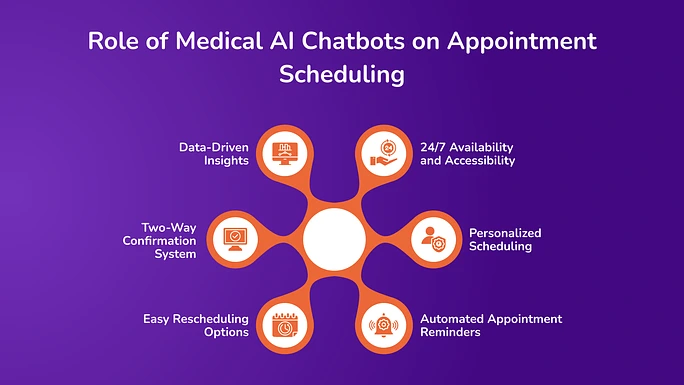
Conventional scheduling often involves long hold times on phone calls, back-and-forth emails, and manual coordination between patients and healthcare providers. AI chatbots improve accessibility, personalize schedules, and significantly reduce missed appointments. Below is a detailed explanation of how AI chatbots enhance appointment scheduling.
1. 24/7 Availability and Accessibility
AI chatbots operate around the clock, allowing patients to book appointments anytime without waiting for office hours or human assistance. Previously, patients had to call medical offices, navigate automated menus, and wait for an available representative. AI chatbots eliminate this hassle by providing instant scheduling assistance.
AI-powered scheduling systems are available 24/7, meaning patients can book or modify appointments at their convenience, even during weekends or late-night hours. Medical AI chatbots are integrated into multiple platforms, such as hospital websites, mobile apps, and messaging services like WhatsApp, making scheduling more convenient. By automating appointment bookings, administrative staff can focus on more critical tasks instead of handling repetitive scheduling requests.
2. Personalized Scheduling
AI chatbots optimize appointment scheduling by considering patient preferences, provider availability, and urgency. Chatbots assess patient needs and recommend appropriate specialists based on symptoms, medical history, and provider expertise.
AI scheduling systems sync with clinic and hospital calendars, ensuring patients only see and book available slots and preventing double bookings. Medical AI chatbots can suggest appointment slots based on a patient’s preferred time, urgency level, and the doctor’s schedule.
Chatbots reduce the number of last-minute cancellations by allowing patients to reschedule easily, ensuring better appointment management.
Many hospitals and clinics use AI scheduling tools to streamline operations. For instance, CHAT360 uses AI to schedule appointments based on a patient’s history and doctor availability, improving clinic efficiency. Zocdoc provides AI-driven scheduling, allowing patients to book appointments based on their symptoms and preferred doctors.
3. Automated Appointment Reminders
AI chatbots send SMS, email, or app notifications reminding patients of upcoming appointments. These reminders include essential details such as the appointment date, time, location, and any necessary pre-visit instructions. This ensures that patients are well-prepared and less likely to forget or miss their scheduled visits. By providing timely alerts, AI-powered reminders improve patient compliance and reduce the administrative burden on healthcare staff.
4. Easy Rescheduling Options
If a patient cannot make an appointment, AI chatbots allow them to reschedule immediately, reducing the likelihood of last-minute cancellations. AI chatbots make rescheduling quick and hassle-free, allowing patients to choose a new date and time without needing to call the clinic. This helps healthcare providers fill vacant slots efficiently, ensuring that appointments are utilized effectively and reducing revenue loss from no-shows.
5. Two-Way Confirmation System
AI chatbots ask patients to confirm their appointments, helping clinics predict attendance and optimize scheduling. This feature allows healthcare providers to track attendance in real-time, indicate availability, and adjust schedules accordingly. It also will enable clinics to prioritize urgent cases by reallocating appointment slots that would have otherwise gone unused.
6. Data-Driven Insights
AI can analyze past patient behaviors to predict potential no-shows and send additional reminders or follow-ups to high-risk patients. Medical AI chatbots can send additional follow-up reminders or provide flexible scheduling options to encourage attendance. This data-driven approach helps clinics improve appointment adherence, optimize patient flow, and reduce overall disruption caused by missed visits.
Challenges and Limitations of Healthcare AI Chatbots
While AI chatbots have brought many improvements to healthcare, they also face significant challenges. Below is a list of a few challenges that healthcare chatbots can face:
1. Data Privacy Concerns
If patient information is not secured correctly, it could be exposed to hackers, leading to serious privacy violations. Healthcare chatbots must comply with strict regulations like HIPAA (Health Insurance Portability and Accountability Act) in the U.S. or GDPR (General Data Protection Regulation) in Europe to ensure patient data remains confidential. Developers must implement strong encryption and secure storage methods to protect patient data from cyber threats.
2. Potential Biases in AI Algorithms
AI chatbots rely on machine learning algorithms trained on medical data. However, if the training data is not diverse, the chatbot may develop biases that lead to inaccurate or unfair medical advice.
AI models trained on limited data may perform well for some patient groups but poorly for others. For example, some AI diagnostic tools have shown lower accuracy in detecting conditions in patients with darker skin tones, leading to disparities in healthcare. AI models must be trained on a wide range of patient demographics to avoid biased results, including different ages, ethnicities, and health conditions.
3. Need for Constant Updates
Medical knowledge evolves rapidly, with new research, treatments, and guidelines emerging regularly. AI chatbots must be updated frequently to stay relevant and accurate.
If a chatbot is not updated, it may provide medical advice based on outdated guidelines, potentially leading to incorrect recommendations. Unlike human doctors who stay current through medical training, AI chatbots do not learn independently; they require manual updates to their knowledge base.
4. Risk of Inaccurate Diagnoses
While AI chatbots can assist with initial symptom assessment, they lack the profound clinical judgment of trained medical professionals. This means there is always a risk of providing incorrect diagnoses or misleading medical advice.
AI chatbots can recognize symptom patterns but cannot perform physical examinations or consider complex medical histories like doctors can. If a chatbot misinterprets symptoms or fails to acknowledge a serious condition, a patient may not seek timely medical care.
Chatbots should always be seen as a tool to assist, not replace, healthcare providers. Patients must understand that AI chatbots are for guidance only and should not be relied upon for critical medical decisions.
Harness the Power of Generative AI with Avahi’s Secure, Scalable AI Solutions
At Avahi, we empower businesses to deploy advanced Generative AI that streamlines operations, enhances decision-making, and accelerates innovation—all with zero complexity.
As your trusted AWS Cloud Consulting Partner, we empower organizations to harness AI’s full potential while ensuring security, scalability, and compliance with industry-leading cloud solutions.
Our AI Solutions Include
- AI Adoption & Integration – Leverage Amazon Bedrock and GenAI to enhance automation and decision-making.
- Custom AI Development – Build intelligent applications tailored to your business needs.
- AI Model Optimization – Seamlessly switch between AI models with automated cost, accuracy, and performance comparisons.
- AI Automation – Automate repetitive tasks and free up time for strategic growth.
- Advanced Security & AI Governance – Ensure compliance, fraud detection, and secure model deployment.
Want to unlock the power of AI with enterprise-grade security and efficiency?
Start Your AI Transformation with Avahi Today!

